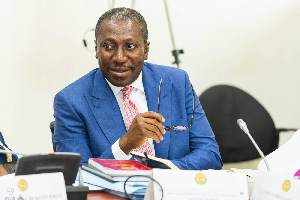Dr Kyei Faried, Deputy Director, Disease Control and Prevention Department, Ghana Health Service (GHS), has called for effective leadership assistance as a pragmatic measure in preventing a possible outbreak of the Ebola Viral Disease (EVD) in the country.
This, he said, would be a collective preventive measure of dealing extensively with the EVD from hitting Ghana as it had already done in some West African countries.
“Effective measures have been put in place to for the treatment of a possible EVD in Ghana but an effective leadership assistance at all levels is the main tool for dealing with Ebola in the country,” he said.
Dr Faried made the call at the formal launch of the EVD awareness week which was organised by the GHS and in partnership with the World Vision Ghana in Accra on Friday.
Explaining to stakeholders what the EVD was, Dr Faried defined Ebola as a killer disease caused by a germ virus called the Ebola Germ which is mostly found in fruit bats.
He said the disease, which is a systemic disease once contracted, affects the various systems of the body with its spread being quick from one person to another adding that “the incubation period lasts between two to 21 days”.
Going into detail on the signs and symptoms of the EVD, Dr Faried said sudden fever, vomiting, (sometimes with blood), diarrhoea, body rash, blood spots in the eyes, blood in cough or stool, bleeding from the nose or other body parts were some of the alarming signs and symptoms of Ebola.
On the mode of spread, he noted that EVD was spread through direct physical contact with body fluids like blood, saliva, stools, vomits, sperms, urine, and sweat of an infected person.
“Also, direct physical contact with materials and other items used by infected person, use of skin piercing instruments that have been used by infected persons as well as unsterilised injection,” Dr Faried said.
He indicated that, direct physical contact with someone who has died of the Ebola disease, touching and handling or eating fruits and other foods that had been partly eaten by infected animals such as bats and monkeys could also factor the spread of EVD.
Dr Faried, however, added that the disease which kills in a short time could be prevented when there is the avoidance of contact with body of fluids of persons showing the signs and symptoms above, and the usage of materials like gloves, goggles and masks.
“Do not shake hands with persons showing signs of Ebola, wash your hands regularly with soap under running clean water especially when there are confirmed cases within your community, avoid eating improperly cooked meat such as bat and monkeys, do not touch or handle dead or live animals such as bats or monkeys with your bare hands and finally persons showing signs should be taken to the nearest health unit immediately for proper management,’’ he said.
He also advised the public not to touch or handle persons who have died of Ebola and rather report to the nearest health facility, report any suspected cases of Ebola to the nearest health unit immediately, do not touch or use the clothing and other materials used by an infected person, avoid feasting and long funerals including communal washing of hands during funeral rites as well as the eating of dead animals especially bats and monkeys.
“Let us cultivate the habit of carrying sanitizers on us wherever we may go. And please if you can’t afford that it will be better you carry a medicated soap in your bag to wash your hands at short intervals,” Dr Faried said.
Mr Hubert D. Charles, National Director, World Vision Ghana, lauded the Government for the efforts carried out in preventing, managing and containing the outbreak of EVD in the country through the Ministry of Health, National Disaster Management Organisation and other partners.
He said World Vision had prioritised the sustained well-being of children, especially the most vulnerable, within families and communities and to ensure children enjoyed good health and are cared for, as well as protected in this emergency situation and had committed about 1.5 billion US dollars globally to contribute to the reduction and preventable deaths among children under five years of age.
Mr Charles noted that since 1981, World Vision Ghana had responded to over 19 different types of emergencies in Ghana and expressed their long term commitment with the Ministry of Health, GHS and other partners to leverage their experience and expertise to collectively address challenges confronting the health care delivery of the Ghana.
“Our sponsorship of this campaign launch against Ebola Virus Disease signifies the importance World Vision attaches to the challenge confronting us as a people at this point in time especially when World Vision has initially supported the Government and partners with the sum of GHC 661,250 towards the prevention, management and containing of the disease”, said.
Dr Sally-Ann Ohene, Disease Prevention and Control Officer, World Health Organisation (WHO), reading a speech on behalf of Dr Magda Robalo, WHO Representative of Ghana, called for intensive education from the national to community levels of the country for citizens to be abreast of the requisite knowledge on preventing the EVD.
She said WHO was collaborating with Government in helping to prevent the outbreak of the disease in the country for better and safe living conditions to continue to exist amongst citizens.
Dr Ebenzer Appiah-Denkyira, Director General, GHS, launching the weak awareness campaign and leaflets and educational materials, said it was important that citizens protected themselves, families and communities from Ebola by observing the preventive measures above.
He, however, announced 0299009958 and 0299009949 as the Ebola emergency line.
Health News of Saturday, 16 August 2014
Source: GNA
Ebola awareness week launched
Entertainment












